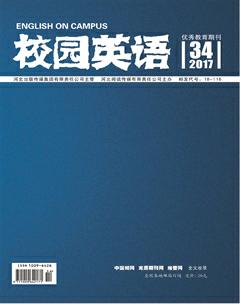A Survey on Classroom Discourse
Tan+Jiong
【Abstract】This discussion is based on several hours of teaching-learning case study conducted in a secondary school classroom, which emphasizes integrated curriculum to understand the unseen social processes, i.e. Teacher dominance in discourse. It is found that the nature of the learning process in the classroom hardly focused on students thinking skills. Besides, it argues that students should be given the opportunity to exercise their critical and creative potentials.
【Key words】classroom discourse; dominance integrative
Classroom discourse refers to the type of language use that is found in classroom situations. It seems to offer autonomy and opportunity to teaching and learning interaction between student-teacher and student-student;on a superficial level, it appears pedagogically to be a social process that is par excellence. Such classroom discourse makes possible situations in which learning becomes more fun, student participation is active and teaching-learning activities are effective. Moreover, such situations also allow teachers to fine-tune them
classroom discourse is usually analyzed and understood in a transparent context, namely as the collective space where an individual interacts, discussing knowledge in a specific subject or matters that are “out there”, which is like the works of Sinclair (1975). Hence, contrary to this phenomenon we posit that in the context of this study two social practices, namely power and control, are embedded in or hidden within a classroom discourse based upon an integrative curriculum. Many speakers, especially teachers, are unaware of this notion. As such, classroom discourse basically lacks the ability to achieve the pedagogic aims of an integrative curriculum. This is due to classroom discourse having primarily interactive functions that marginalize knowledge inputs or thinking abilities.
Discourse analysis has been carried out in the classroom so that we can evaluate output of the teacher and the students, the procedures in classrooms, and the types of teacher-student relationships. The classroom language has been primarily analyzed on linguistic descriptions of syntax, phonology, and semantics;however, discourse analysis which considers the contexts and cultural influences beyond the description of language above the sentence is now forming a backdrop to studies in applied linguistics and second language learning. For example, even in the traditional classroom where rigid roles between the teacher and the students exist, the teachers usually ask questions and the students answer and the discourse structure is expected to be very limited, we can raise our awareness of the use of language for human communication by examining discourse analysis. Furthermore, in more recent trends in the classroom where pair and group works are employed in addition to the traditional roles between the teacher and the students, other patters of forms and talks between the student and the student, or the students and the teacher can be revealed. These findings are expected to contribute to judging approaches to language classrooms and offer new applications in language teaching regardless of classroom contexts.endprint
The classroom discourse analyzed is embedded with teacher domination practice. Teacher domination means the teacher controlling not only the discourse but also the students. Because of this control, the role of the student as the main target of education process seems to be relegated, and instead it is the teacher who plays central role. Although the language used in the classroom lacked the naturalness in terms of syntax, lexis, and fluency, it contained various functions of interactional sequences and speech acts that are observed in authentic, natural communication. The teacher did not realize a variety of meanings of discourse markers that she frequently used in the classroom until her discourse was analyzed. These analyses helped the teacher notice her own discourse in the classroom and the influences that will placed on students.
References:
[1]Sinclair,J&M.C.Coulthard.Towards an Analysis of Discourse [M].London:Oxford University Press,1975.
[2]Chin,C.Classroom interaction in science:Teacher questioning and feedback to students responses[J].International Journal of Science Education,2006,28(11).
[3]Zhai,J.Engaging children in learning ecological science:The pedagogical practices of botanic garden educators[D].Unpublished doctoral thesis,Kings College London,UK,2011.endprint

